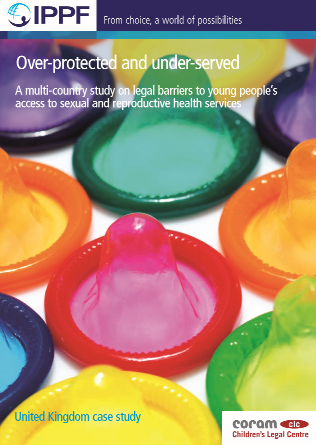
Articles by Over-protected and under-served: Legal barriers to young people’s access to sexual and reproductive health services

UK: A study on legal barriers to young people’s access to sexual and reproductive health services
The key legal barrier to accessing services in the UK is the almost total prohibition on abortion in Northern Ireland and the need to travel to England and pay for abortion which disproportionately disadvantages young women. Lack of legally mandated comprehensive sexuality education, and lack of legal recognition of people who do not identify within the gender-binary norms or are intersex, also represent significant barriers to access. There are many permissive and facilitative laws and practices in the UK, which should ensure good access to SRH services, and are intended to be protective without hampering access to services, but access is compromised by other factors including: conflict between the stigma associated with younger aged sex (especially for girls) and media and peer cultures endorsing sexual activity bad delivery of sex education by teachers who are uncomfortable with the subject, which reinforces taboos concerns about the confidentiality of services in spite of legal obligations on service providers – especially in schools which often operate their own rules on reporting sexually active teens, and in small rural communities where service providers and pharmacists may know the young person’s family quality of service for LGBT youth may be poorer because of lack of knowledge or understanding of same-sex sexuality or non-binary gender identities most young people and service providers don’t see the law as an obstacle to services though beliefs about the age of consent does prevent some young people seeking SRH services the legal right of schools to refuse to teach CSE and of individual parents to withdraw children from classes reinforces the idea that informing young people about sex is corrupting and that young people have no independent rights regarding information and access to health services where CSE does exist it often focuses solely on the biological and inadequately addresses the law and young people’s rights within it young people report being reliant on information from the internet which includes poor sources of information and porn robust laws against sexual violence are undermined by victim-blaming and the low rate of rape prosecutions and convictions, which prevents people coming forward to report rape access to antenatal care is good and not perceived to be limited by legal issues Northern Ireland has different laws and practices to other parts of Britain and these are less permissive, more restrictive and more likely to present barriers to access. These reflect a more conservative culture which negatively impacts access even where it is not restricted by law. girls are more likely to conceal their or delay accessing services as all pregnancy options are stigmatised - young motherhood, adoption and abortion cultural and religious norms in Northern Ireland promote abstinence before marriage and reinforce stigma around youth sexuality which hampers discussion between young people and their parents the law in NI doesn’t require teaching of LGBT issues having to travel to specialist services represents a high cost, presents difficulties maintaining privacy and acting independently from parents and is a significant barrier for youth in rural areas especially in Northern Ireland which is underserved







